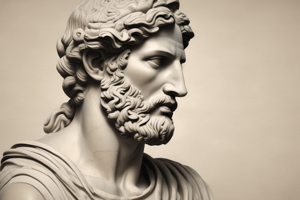Podcast
Questions and Answers
Flashcards
Minoan Civilization
Minoan Civilization
A Bronze Age civilization that flourished on the island of Crete from roughly 12,000 to 1450 BC. They are known for their advanced culture, impressive architecture, and intricate writing system known as Linear A.
Mycenaean Civilization
Mycenaean Civilization
A Bronze Age civilization that arose on the mainland of Greece around 1600 BC. They are known for their powerful warrior culture, fortified cities, and their use of a writing system called Linear B.
Dark Ages in Ancient Greece
Dark Ages in Ancient Greece
A period of decline and fragmentation in Greece that followed the collapse of the Mycenaean civilization around 1100 BC. It was marked by a decrease in population, trade, and literacy. It is theorized that the Mycenaean civilization succumbed to both internal strife and external pressures, thus launching Greece into a period of chaos.
Hoplite Phalanx
Hoplite Phalanx
Signup and view all the flashcards
Tyranny in Ancient Greece
Tyranny in Ancient Greece
Signup and view all the flashcards
Study Notes
Greek History: Bronze/Dark Ages
- Minoans (12000-1450 BC) on Crete, Crete was the first Greek area to be settled. They were destroyed by Mycenaeans.
- Mycenaeans (1600-1100 BC) were on mainland Greece. They used Linear A and B writing, and were known for the Mask of Agamemnon.
- Dark Ages (post-Mycenaean) marked fragmentation of Greek culture.
Archaic Period
- Hoplite phalanx, a fighting style, was developed.
- Religion, through cults like Epidavros, was important.
- Olympic games emerged, oracles like Delphi were significant.
- Trade and colonization were prevalent.
- A shift to tyranny as a form of government, with figures like Peisistratus in Athens.
- Democracy emerged in Athens
Classical Period
- Persian Wars (mid 6th century BC) led to significant conflicts.
- Greek victories against Persia, notably the Battle of Marathon
- Athenian democracy flourished
- Sparta's rule of the Messenians and use of helots.
- Xerxes continued conflicts with Greece.
Studying That Suits You
Use AI to generate personalized quizzes and flashcards to suit your learning preferences.




